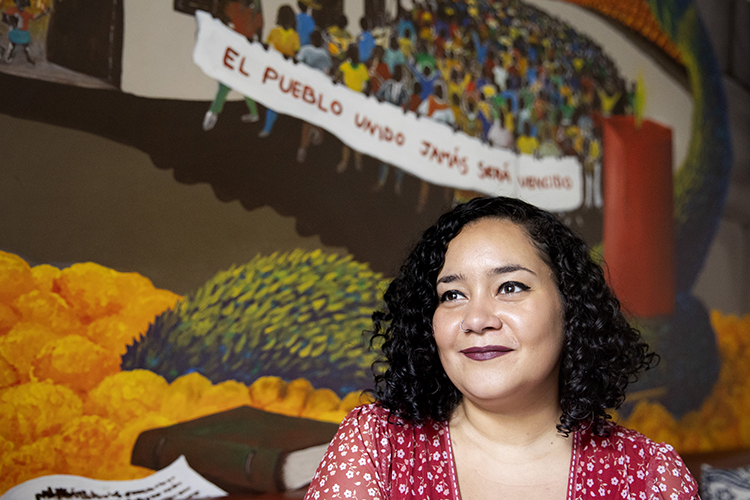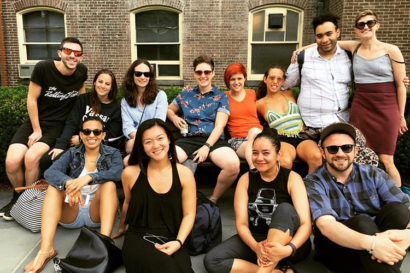Follow Berkeley Voices, a Berkeley News podcast about the people and research that makes UC Berkeley the world-changing place that it is.
See all Berkeley Voices episodes.
In episode 99 of Berkeley Voices, Berkeley Law student Indi Garcia, who is graduating on May 13 with pro bono honors for her work on the Post-Conviction Advocacy Project, talks about how meeting with incarcerated men as a college student inspired her anti-prison and criminal justice work. “These men were just brilliant,” said Garcia. “They were so much more than the crimes that led them there.”

Berkeley Law student Indi Garcia is graduating on May 13 with pro bono honors for her work on the Post-Conviction Advocacy Project. (Photo by Brittany Hosea-Small)
Read a transcript of Berkeley Voices episode 99: Law student Indi Garcia lives and breathes the ‘abolitionist philosophy’:
Anne Brice: In the late 2000s, Indi Garcia spent every Friday at Otisville Correctional Facility in New York.
[Music: “Lakeside Path” by Blue Dot Sessions]
She was a student at Vassar College, where she was one of 15 students who were part of an internship program called Bridging the Gap.
Every week, they’d spend the day with incarcerated men who were going to be released soon and wanted to know what the outside was like — how things had changed or stayed the same, and how they might begin to navigate their freedom.
For Indi, going into the prison week after week was scary. She’d had friends and family members absent from her life because they were incarcerated, and choosing to go to a place that she’d always been told to avoid left a pit in her stomach.
Indi Garcia: It was tough every week to go to prison and have the COs, you know, they really looked at me more. I was different. I was always criticized, like, “Oh, your shirt’s too low.” I’m like, “I’m wearing the same as everyone else.”
Anne Brice: But after Indi was cleared by the correctional officers and went to the classroom where she met with the incarcerated men, she could finally relax.
Indi Garcia: These men were just brilliant. They were so much more than the crimes that led them there.
[Music fades down]
We talked about things, like, what is Facebook? And, you know, the Internet and social media. Some of these men had been incarcerated for decades and, you know, a lot has changed since the ‘80s when they were first locked up. So, we talked about things like that.
But we also talked about racism and sexism in the Black community, or misogyny, things like that that were also important. So, it’s kind of like we learned from each other.

Indi on her birthday with her mom, Maria, in New York City. Indi and Maria immigrated to the U.S. from the Dominican Republic in 1991, when Indi was 2 years old. (Photo courtesy of Indi Garcia)
Anne Brice: She says the biggest thing she learned is that people are more than their mistakes. It’s why she doesn’t believe in prisons, and why she thinks that it’s so important to understand the root causes of why people commit certain crimes, instead of demonizing or pathologizing symptoms of much deeper societal issues.
Indi Garcia: It’s so easy when you hear that someone murdered someone to think, “That person’s depraved, or that person should be locked away forever.” And I don’t want to minimize or trivialize what it is to be a survivor or to have a family member taken away from you by what seems like senseless violence, because that’s also very traumatic and unfortunate.
But I do think that there’s power in understanding. And so, that was why that program was really important to me, just because it made me realize that, yes, when they were 15, they made this really bad mistake. But for the last 20-plus years, they’ve been healing and trying to be better. And who they are today is very far from who they were when they committed their life crime.
[Music: “Cornicob” by Blue Dot Sessions]
Anne Brice: Indi participated in Bridging the Gap during her four years in college. And now, more than a decade later, she’s about to graduate on May 13 with a Juris Doctor degree from UC Berkeley’s School of Law, where she has been part of the Post-Conviction Advocacy Project, helping incarcerated people with the parole process.
This is Berkeley Voices. I’m Anne Brice.
[Music fades down]
Indi was born in the Dominican Republic and moved to the U.S. when she was 2. She grew up in the Bronx in New York City, where she and her mom barely scraped by.
Indi Garcia: I was a first-, I mean, not even first-generation, zero-generation immigrant, and we struggled a lot with housing insecurity, food insecurity. My mom was bouncing around with jobs. She was learning English while trying to take care of me. So, yeah, it was a lot. And she was a single mother, too. But I didn’t know we were struggling, if that makes sense.
Anne Brice: She didn’t know they were struggling because most people in her neighborhood and at school were struggling in similar ways. It was just the way things were.
So, when Indi started in 2007 as a student at Vassar College, a top liberal arts school where most students were white and well-off, she realized how different her reality was from theirs.

Indi with some friends from Vassar College at their five-year reunion. Although being at Vassar was a culture shock for Indi, it was also a place where she learned about the systems of poverty and racism. (Photo courtesy of Indi Garcia)
Indi Garcia: I think being at Vassar, where people were able to eat out all the time or go on vacations or talk about what they did over the summer or even simply being able to afford books, new books, that was just such a culture shock.
Anne Brice: But it was also a place where she began to unlearn some of the things she’d assumed to be true when she was growing up. As a political science and Africana studies major, Indi learned about institutional racism and how poverty is systemic and not an individual problem, as it’s often portrayed in our society.
Indi Garcia: Before college, I had the perspective, particularly coming from my neighborhood, where most people drop out of high school, get pregnant, like, at least girls my age, I always felt like — because I was individualizing the struggle — I always felt like, “If I can do it — if I can go to college, if I can do my homework, if I can succeed, why can’t you?” And I kind of pathologized that behavior. Because, again, I was thinking about it individually.
And then I took these courses, and I realized that I’m the outlier here, you know, and just because I was able to, because of luck or people believing in me or me just working a little harder, like, a combination of all those things — that’s why I’m here.
[Music: “Quiet Still” by Blue Dot Sessions]
Anne Brice: Indi went on to be an educator, working to expand and promote higher education access for youth. She taught creative writing courses to middle school students and she worked as a kind of college counselor at a few charter schools, among other jobs. And after 10 years in the field, Indi decided to apply to law school to continue her anti-prison and criminal justice work.
As a student at Berkeley Law, Indi has been part of the Post-Conviction Advocacy Project, a pro bono program that trains law students to assist incarcerated people in California with the parole process. It’s run by the nonprofit UnCommon Law.

Indi talks with students Raymond Durham and Alyssa Kewenvoyouma, both of whom are graduating from Berkeley Law this May. Raymond has also been part of the Post-Conviction Advocacy Project. (Photo by Brittany Hosea-Small)
Since 2019, Indi and two other students have represented a man who is sentenced to life in prison at San Quentin State Prison. They represented him at his second parole board hearing, but he was denied. They filed a habeas corpus petition, but that was denied. So now, they’re gearing up for his next parole board hearing in September. So far, Indi has dedicated nearly 160 hours to her client and is graduating with pro bono honors.
After graduation, Indi will begin work in fall 2022 at a civil law firm, where she hopes to do appellate work and general litigation. In 2024, she’ll clerk for a year with California District Court Judge Jesus Bernal. She’d also like to work in appellate federal Indian law, inspired by courses she took on the subject with professor Seth Davis.
Indi Garcia: It’s a very gray area of the law, and it’s constantly changing. And it’s also super important — it’s about supporting and making sure that the first peoples of this country have sovereignty and autonomy and support from a government that has ruined their lives, honestly.
Anne Brice: And eventually, Indi plans to go back to policy-focused work in abolition and criminal justice. Her dream would be to work at an organization like the Vera Institute of Justice, a nonprofit dedicated to ending mass incarceration.
[Music fades down]
But the most important thing to her is that she continues to live and breathe what she calls the abolitionist philosophy, pushing back on the narrative that people’s problems are always their own fault and, instead, trying to understand and fix the societal structures that put them there.
[Music fades up]
You can learn more about Berkeley Law’s Post-Conviction Advocacy Project and about the law school’s dedication to bro bono work at law.berkeley.edu.
This is Berkeley Voices, a Berkeley News podcast from UC Berkeley’s Office of Communications and Public Affairs. I’m Anne Brice. You can follow Berkeley Voices on Apple Podcasts, Spotify or wherever you listen. If you like what we do, please follow us and leave us a rating and review. You can find all of our podcast episodes with transcripts and photos on Berkeley News at news.berkeley.edu/podcasts.

After Indi graduates, she will begin work in fall 2022 at a civil law firm. Eventually, she plans to to go back to policy-focused work in abolition and criminal justice. Her dream would be to work at an organization like the Vera Institute of Justice, a nonprofit dedicated to ending mass incarceration. (Photo by Brittany Hosea-Small)